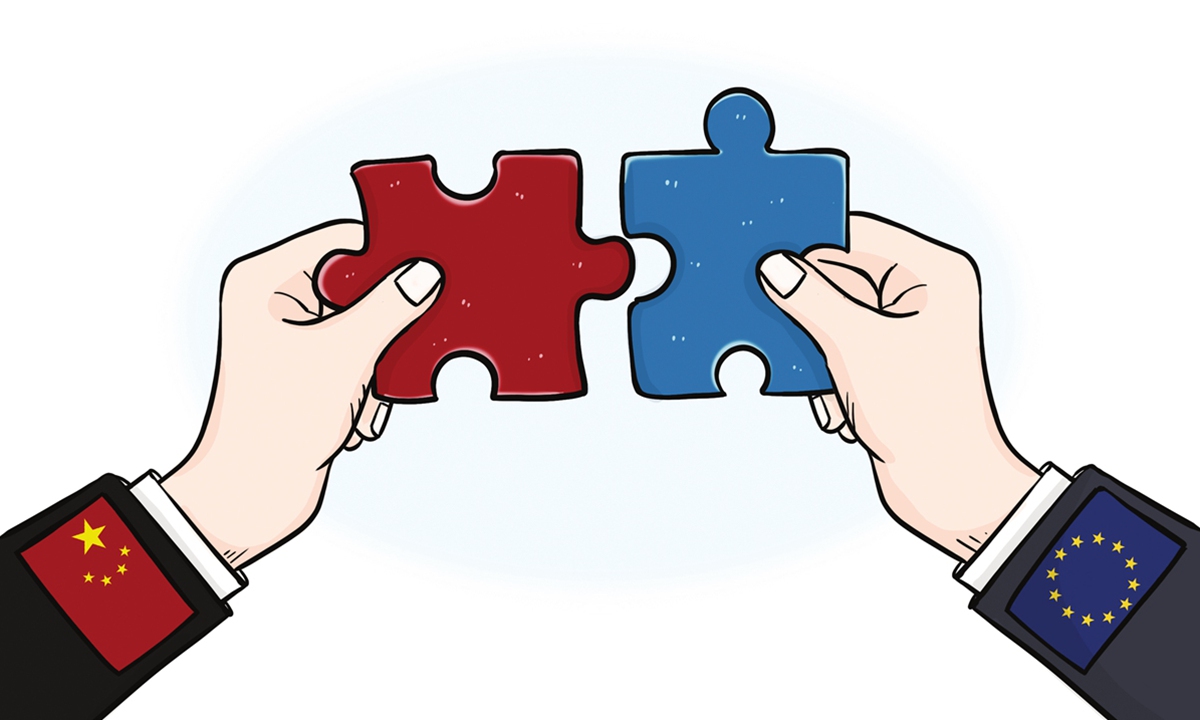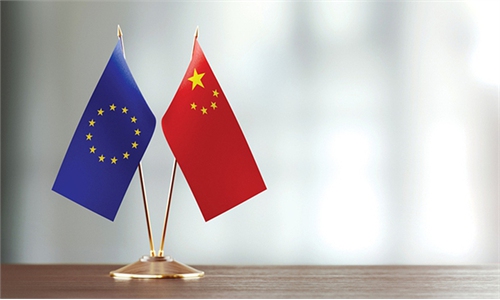Borrell's trip conducive to the healthy, stable devt of China-EU ties: FM
Talks expected to be pragmatic, frank over cooperation, 'de-risking'

China EU relations
The Chinese Foreign Ministry on Wednesday announced EU foreign policy chief Josep Borrell's China trip and expressed welcome, saying his visit is conducive to the healthy and stable development of China-EU relations. It noted that China is willing to work with the EU to strengthen strategic communication, coordination and cooperation, enhance mutual trust and appropriately handle differences, as the two powers share a wide range of common interests.
Analysts believe that talks between Borrell and Chinese officials will take place in a pragmatic and frank manner, covering cooperation prospect as well as on "de-risking" that could result in trouble to bilateral ties. Despite their differences, the mutual needs of the two sides over a wide range of areas of interest and cooperation will help maintain the stable development of China-EU relations.
At the invitation of Member of the Political Bureau of the CPC Central Committee and Foreign Minister Wang Yi, Josep Borrell, high representative of the European Union for Foreign Affairs and Security Policy and vice-president of the European Commission, will visit China and the two sides will hold the 12th round of the China-EU High-level Strategic Dialogue from October 12 to 14, the Chinese Foreign Ministry announced on Wednesday.
Ministry spokesperson Wang Wenbin said at a routine press briefing on Wednesday that China welcomes High Representative Josep Borrell to visit China and the opportunity to hold a new round of China-EU High-level Strategic Dialogue. This will contribute to the sound and steady growth of China-EU relations, lay the ground for future high-level interaction and invigorate joint response to global challenges and efforts for global peace and stability.
Since this year began, Chinese and EU leaders have had frequent exchanges. Dialogue and cooperation has been carried out across the board at various levels. China-EU relations have shown a positive momentum of growth, Wang said.
China and Europe share extensive common interests in the world's peace, stability and development and human progress. Our relations have global influence and significance. China stands ready to work with the EU to stay committed to our comprehensive strategic partnership, enhance strategic communication and policy coordination, increase mutual trust, expand cooperation, overcome disturbances, properly settle differences and deliver more benefits to our two peoples and the world, the spokesperson said.
Pragmatic, frank talks expected
Borrell's visit, which has been postponed twice, comes at a crucial time when the EU seeks to reduce reliance on China over "de-risking" concerns, while seeking to maintain ties with the world's second-largest economy. The two sides are expected to lay the groundwork for the China-EU summit, despite being at odds over Brussels' "anti-subsidy probes" which target Chinese steel producers and electric vehicle makers.
Cui Hongjian, a professor with the Academy of Regional and Global Governance under the Beijing Foreign Studies University, told the Global Times on Wednesday that China will put forward its views on the EU's recent actions, correct the EU's perception of China, and avoid creating more trouble with the EU's unilaterally proposed concepts and policies.
"For instance, what does 'de-risking' means at the political and diplomatic level? 'De-risking' is currently focusing on trade, investment and technology, but will it get off track and raise more risks at the political and diplomatic level?" Cui asked.
The EU has already put in place punitive tariffs on 20 Chinese steel and stainless steel items and set import quotas. At the end of 2021, the EU imposed tariffs on imports of steel towers used for wind turbines from China after an investigation.
Wang Guoqing, research director at Beijing Lange Steel Information Research Center, told the Global Times on Wednesday that the tariff measures against Chinese-made steel are actually rising protectionist moves to protect local industry, which is likely to trigger countermeasures from China.
Zhao Junjie, a research fellow at the Chinese Academy of Social Sciences' Institute of European Studies, told the Global Times on Wednesday that Borrell comes to China with questions, expectations, and demands. "He may also want to sound out the Chinese government's perception of Europe."
Borrell has criticized China over "human rights" issues and China's neutral stance on the Russia-Ukraine conflict. But in a phone call with China's top diplomat Wang Yi in August, Borrell said he wants to strengthen EU-China relations.
Europe is facing a sluggish economy, inflation and other social problems; populism and trade protectionism are soaring. To really solve those problems requires Borrell to stay away from empty ideology and rhetoric, and make substantial efforts to boost Europe's business and revitalize manufacturing, noted Zhao.
It is hoped that Borrell will take a more pragmatic attitude and have frank and in-depth conversations with China, so as to find out what topics the two sides can agree upon, what needs to be put aside, and what the two sides should compromise on, Zhao told the Global Times.
Mutually needed
Despite the differences and challenges that still exist between China and the EU, analysts believe that the two sides agree on at least one point, namely, the hope that China and Europe will come out of the negative impacts of the previous few years and move toward stability again. The resumption of existing communication mechanisms such as the China-EU High-level Strategic Dialogue is aimed at realizing this goal.
"The adjustment of the EU's China policy will bring more variables and risks. However, it is believed that after a period of time, the two sides can cooperate in some new areas," Cui said. "Cooperation does not necessarily stem from complete consensus, but from mutual need. As long as China and Europe still need each other, bilateral relations may achieve stability."
Analysts believe that the Russia-Ukraine conflict and the latest Palestinian-Israeli conflict will be raised at the strategic dialogue. Despite there being differences between China and the EU on these issues, which are not differences in principle, there is the possibility of cooperation for the two sides even in some sub-fields.
"On the Palestinian-Israeli conflict, Europe and the US have different stances. The Europe has been taking a relatively balanced position, which is aimed at avoiding a long period of chaos in the Middle East, as otherwise the chaos would bring problems to Europe, such as refugees and terrorist attacks. It's believed that Borrell will not be as aggressive as the US on the issue," Cui said.
China understands that Europe's strategic space is largely restricted to the US' path, and China will also take into account the predicament Europe finds itself in at the moment, Zhao said. "China will also show flexibility as it wants to negotiate for mutually beneficial and win-win results rather than reiteration of principles," he said.
On September 25, Chinese and EU officials held a face-to-face high-level economic and trade dialogue in Beijing for the first time since the pandemic, with a series of new agreements in various areas reached. Borrell's colleague, EU Energy Commissioner Kadri Simson, is also visiting China in a separate trip from Wednesday to Friday, attending the EU-China energy dialogue, already in its 11th edition, with China's National Energy Administration Director Zhang Jianhua in Beijing, per media reports.



